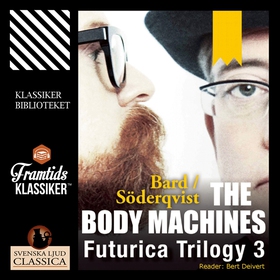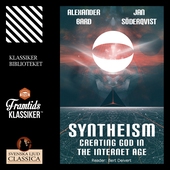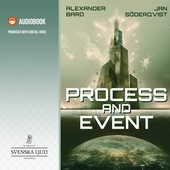
Lägg till önskelistan
Gratis smakprov
- Spara till biblioteket
- Lyssna på smakprov
The Body Machines (Futuricatrilogin) ljudbok
Pris
149 kr
Following the massive international success The Netocrats and its ambitious follow-up The Global Empire, in this third installment of The Futurica Trilogy, Bard & Söderqvist approach something far more personal – the fragile human being herself and, most of all, her brain. The Body Machines, with a title borrowed from René Descartes, explains what a brain is, how it has developed and how it functions, and why it spends such an incredible amount of time and energy on fooling itself. The Bo...
Ljudbok
149 kr
Pris
Förlag
Saga Egmont
Utgiven
17 Mars 2016
Längd
9:34
Genrer
Media & Kommunikation, Fackböcker
Serie
Futuricatrilogin
Språk
English
Format
mp3
Kopieringsskydd
Vattenmärkt
ISBN
9789176394274
Following the massive international success The Netocrats and its ambitious follow-up The Global Empire, in this third installment of The Futurica Trilogy, Bard & Söderqvist approach something far more personal – the fragile human being herself and, most of all, her brain. The Body Machines, with a title borrowed from René Descartes, explains what a brain is, how it has developed and how it functions, and why it spends such an incredible amount of time and energy on fooling itself. The Body Machines matches and mixes the latest neuroscience with philosophy and psychoanalysis, in the process portraying a confused but incredibly interesting little machine that is doomed to constantly create new fictions about itself and its surroundings for its own consumtion, but which remains social by nature, and therefore able to create, together with other similar machines, enormously productive communities. The Body Machines is not only a work of science but also a work of philosophy, a prophetic book on how the humans of the digitalised and globalised future will have to view themselves, their world, and what values and valuations will come to dominate and replace the old and dysfunctional humanism. This is a hybrid book by hybrids for hybrids. This book is part 3 of 3 in the Futurica Trilogy. About the triology: The Futurica Trilogy is a work of philosophy, sociology and futurology in three closely related movements. The first volume, The Netocrats, deals with human history from the perspective of the new elite of Informationalism, the emerging society of information networks, shaped by digital interactivity, making prophecies about the digital future of politics, culture, economy, et cetera. The second volume, The Global Empire, explores the near future of political globalisation and the struggle to form new, functioning ideologies for a world where global decision making is a necessity. The third volume, The Body Machines, deals with the sad demise of the Cartesian subject. It discusses the implications of a materialist image of humanity and explains how it relates to the new, emerging hypertechnological paradigm. It explains why we are all nothing but body machines, and why this is actually good news.
This book is part 3 of 3 in the Futurica Trilogy.
About the triology: The Futurica Trilogy is a work of philosophy, sociology and futurology in three closely related movements. The first volume, The Netocrats, deals with human history from the perspective of the new elite of Informationalism, the emerging society of information networks, shaped by digital interactivity, making prophecies about the digital future of politics, culture, economy, et cetera. The second volume, The Global Empire, explores the near future of political globalisation and the struggle to form new, functioning ideologies for a world where global decision making is a necessity. The third volume, The Body Machines, deals with the sad demise of the Cartesian subject. It discusses the implications of a materialist image of humanity and explains how it relates to the new, emerging hypertechnological paradigm. It explains why we are all nothing but body machines, and why this is actually good news.









